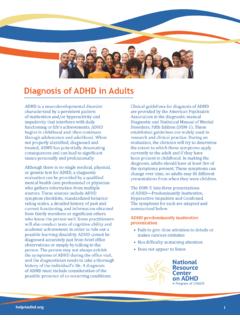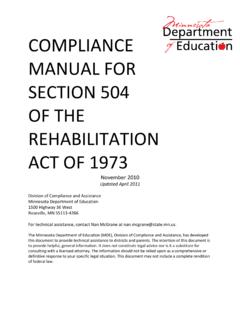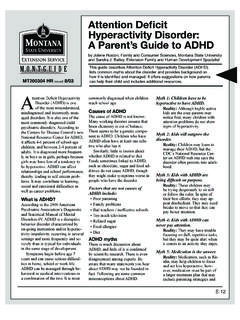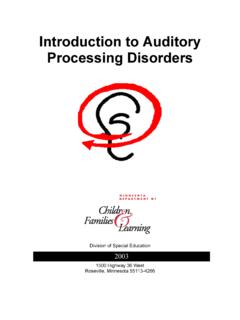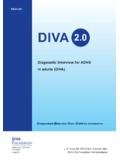Transcription of Executive Function Impairments in High IQ Adults …
1 Journal of Attention Disorders OnlineFirst, published on May 6, 2009 as Journal of Attention Disorders Volume XX Number X. Month XXXX xx-xx 2008 Sage Publications hosted at Executive Function Impairments in high IQ Adults With adhd . Thomas E. Brown Philipp C. Reichel Donald M. Quinlan Yale University School of Medicine Objectives: To demonstrate that high IQ Adults diagnosed with adhd suffer from Executive Function (EF) Impairments that: a) can be identified with a combination of standardized measures and self-report data; and b) occur more commonly in this group than in the general population. Method: 157 adhd Adults with IQ 120 were assessed with 8 normed mea- sures of EF 3 index scores from standardized tests of memory and cognitive abilities, and 5 subscales of a normed self- report measure of EF Impairments in daily life. Results: 73% of subjects were significantly impaired on 5 of these 8 EF. markers.
2 On all 8 measures, incidence of these Impairments was significantly greater than in the general population. Conclusion: high IQ Adults with adhd tend to suffer EF Impairments that can be assessed with these measures; incidence of such Impairments in this group is significantly higher than in the general population. Keywords: adhd ; Executive functions ; high IQ; memory I n our clinical practice, Adults with IQ scores in and above the superior range have sought evaluation and treatment for chronic difficulties with organizing their and deploy their abilities for many important tasks of daily life. They lack adequate self-management skills, as their Executive functions are impaired. Each of these work, excessive procrastination, inconsistent effort, individuals might be compared to a symphony orchestra excessive forgetfulness, and lack of adequate focus for of very talented musicians who cannot produce adequate school and/or employment.
3 They question whether they symphonic music because the orchestra lacks an effec- might have an attention deficit disorder, but often they tive conductor (Brown, 2005). have been told by educators and clinicians that their To date, this problem of adhd in persons with high IQ. superior intelligence precludes their having adhd . has received little attention in the scientific literature. Typically, these very bright individuals report that Antshel et al. (2007, 2008) described 49 high IQ ( 120). they are able to work very effectively on certain tasks in children who fully met diagnostic criteria for adhd as per which they have strong personal interest or intense fear Diagnostic and Statistical Manual of Mental Disorders of immediate negative consequences if they do not com- (4th ed.; DSM-IV; American Psychiatric Association, plete the task at once. Yet they are chronically unable to 1994) and showed a pattern of familiality, cognitive, psy- make themselves do many tasks of daily life they recog- chiatric, and behavioral features typical of children with nize as important but do not see as personally interesting average IQ diagnosed with adhd .
4 However, little has at that moment. When provided treatment appropriate for been published about high IQ Adults with adhd , although adhd , these very bright individuals often report signifi- these individuals provide an excellent example of how cant improvement in their ability to work effectively while general cognitive abilities can be distinguished from their medication is active. Impairments of Executive functions typical in adhd . The chronic difficulties demonstrated by these very Neuropsychological studies have reported Impairments bright individuals when they are untreated illustrate how of various Executive functions among Adults with adhd , persons with adhd may be very competent and talented, but there is significant controversy in the field about yet significantly impaired in their capacity to manage whether clinical neuropsychological tests of Executive 1. 2 Journal of Attention Disorders functions (EF) adequately assess Impairments of EF as of adhd in young Adults are associated with impair- they are manifest in daily life tasks (Barkley et al.)
5 , 2008; ments of EF and adaptive functioning but found that Brown, 2006). Hervey, Epstein, and Curry (2004) neuropsychological tests of EF did not predict impair- reviewed 33 published studies and found that current ment independent of adhd . neuropsychological tests are not sensitive enough to pick Biederman and colleagues (2006) did a controlled up adhd symptoms in Adults . study of Adults with and without adhd using self- . Biederman et al. (2006) used neuropsychological reported symptoms of EF on Barkley's Current Behavior measures of EF to assess Adults with and without adhd . Scale (CBS). They found that Adults with adhd who Defining impairment of EF as scoring standard devia- self-reported elevated levels of EF Impairments on the tions (SD) or more below the mean (lowest 7th percentile) CBS tended to be significantly more impaired on meas- for the control group on any two of eight neuropsycho- ures of global functioning, had more comorbidities, and logical tests of EF they identified a subgroup of 31% of held lower current socioeconomic status than did those their adhd group who were impaired on EF tests, with or without adhd who scored below the median on whereas only 16% of the contol group showed such that scale.
6 Distribution of scores on the CBS showed impairment . Adults with EF Impairments owing to adhd very limited overlap between adhd and control sub- had significantly worse occupational outcomes on these jects; a factor analysis indicated that all 99 items on the psychometric measures than those with adhd who did CBS converged as a single latent variable. Their data not have such Impairments . This led the authors to con- showed that 90% of the adhd subjects had scores clude that psychometrically defined Impairments of EF above the cutoff score at the 93rd percentile of the should be considered a comorbid problem present in controls. about one third of Adults with adhd , compounding their These findings are consistent with results from already compromised workplace functioning. Barkley, Murphy, and Fischer (2008) who used essen- Although such findings from neuropsychological tests tially the same scale to compare Adults with adhd to of EF clearly identify individuals who suffer from severe non- adhd clinically referred patients, and to nonre- Impairments of EF, it is not clear whether such tests are ferred community controls.
7 Their research showed that sufficiently sensitive to pick up the full range of EF questions regarding EF Impairments such as distractibil- Impairments that are characteristic of Adults with adhd . ity, impulsiveness, poor concentration, lack of persist- Investigators of Executive functions in the elderly ence, problems with working memory, and poor (Burgess, 1997; Rabbit, 1997) and researchers in adhd organization were most effective in differentiating Adults (Barkley, 1997, 2008; Brown, 2000, 2005) have argued with adhd from those with other psychiatric disorders that the complex, multifaceted nature of Executive func- and from community controls. tions is such that traditional neuropsychological tests of Previous studies of EF Impairments in Adults with EF are not valid measures of EF Impairments because they adhd involved subjects with a wide range of IQ. They fractionate these integrative functions , and they have too did not address the issue of whether Adults with adhd .
8 Low a ceiling to be sufficiently sensitive. and high IQ demonstrate the same problems of EF as do These limitations of neuropsychological tests of EF those in the wider range of IQ scores. Also, most other were shown by Shallice and Burgess (1991) who demon- studies did not administer a full IQ test to their subjects;. strated that patients with frontal lobe damage were unable they estimated IQ from just a few key subtests. This to perform everyday errands that required planning and method is quite adequate for estimation of overall cogni- multitasking adequately, even though they achieved aver- tive abilities, but it does not provide data necessary for age or well-above-average scores on traditional neuropsy- comparing various combinations of subtests useful for chological tests of language, memory, perception, and assessment of a person's relative strengths and weak- Executive functions . Similar results from assessing EF nesses in cognitive abilities (see Quinlan, 2000).
9 Impairments in more real life situations were reported by The study reported here used clinical interviews, a Alderman, Burgess, Knight, and Henman (2003) who full Wechsler Adult Intelligence Scale Third Edition assessed Adults doing tasks in a shopping mall. Brown (WAIS-III), the Brown ADD Scale, and a verbal memory (2006) has summarized theoretical issues underlying these subtest of the Wechsler Memory Scale Third Edition conflicting views of EF in adhd . (WMS-III) to assess Adults with high IQ who met Other researchers have found that EF Impairments of DSM-IV diagnostic criteria for adhd , any type. With adhd are more adequately identified by self-report and these data, we determined their relative impairment on clinical interviews that query about Impairments of self- standardized measures of three Executive functions : work- management in day-to-day adaptive functioning. Stavro, ing memory, processing speed, and short-term auditory Ettenhofer, and Nigg (2007) demonstrated that symptoms verbal memory and on five clusters of Executive functions Brown et al.
10 / EF Impairments in Adults With adhd 3 assessed by self-report using the Brown ADD Scale for analysis approach as a valid and useful way to compare Adults , a normed rating scale for adhd -related impair- the individual's cognitive strengths against measures of ments of Executive functions that has been found effec- Executive functions necessary to deploy those strengths. tive in assessing Adults (Kooij et al., 2008). Working memory is not a unitary variable; different working memory functions are associated with different modalities and different types of information (Miyake &. Sample Shah, 1999; Baddeley, 2007). Often, working memory is assessed with the Digit Span test, which is not always sen- Charts of Adults who came for evaluation in either of sitive to Impairments of working memory for more com- two adhd clinics, one private, another in a university plex verbal information. Quinlan and Brown (2003).
